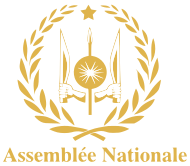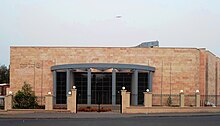National Assembly (Djibouti)
National Assembly Assemblée nationale الجمعية الوطنية | |
|---|---|
| 8th National Assembly | |
 | |
| Type | |
| Type | Unicameral |
| History | |
| Founded | 1977 |
| Leadership | |
President of the Assembly | , UMP |
| Structure | |
| Seats | 65 |
 | |
Political groups | Union for the Presidential Majority (57) (1) |
| Elections | |
Last election | February 2018 |
| Meeting place | |
 | |
| Assemblee Nationale, Djibouti | |
| Website | |
| www | |
 |
|---|
|
|
|
Coordinates: 11°35′45″N 43°08′55″E / 11.595916472648423°N 43.14861465874951°E
The National Assembly, formerly known as the Chamber of Deputies, is the unicameral legislative branch of the government of Djibouti.
Overview[]
It consists of 65 members – 30 Somali (21 Issa) and 30 Afar – elected to serve five-year terms in multi-seat (4 to 37 each) constituencies. The first free multi-party parliamentary election since independence (1977) was held in 2003, with the ruling coalition, led by the People's Rally for Progress (RPP), receiving 62.7% of the vote.
Idriss Arnaoud Ali was President of the National Assembly from 2003 until his death in 2015. He was succeeded by .
For its entire existence, the National Assembly has been dominated by the Popular Rally for Progress, which is presently the senior partner in the Union for a Presidential Majority coalition. From 1981 to 1992, the RPP was the sole legal party. Even after opposition parties were legalized in 1992, the RPP won every seat in the legislature. From 1997 onward, it fought elections as part of a coalition, known since 2003 as the UMP, which continued to sweep every seat. Opposition parties did not manage to enter the legislature until 2013. In the 2018 Djiboutian parliamentary election, which was boycotted by the main opposition parties, the Union for the Presidential Majority won a heavy majority.[1][2] The Djiboutian political system concentrates most power in the president's hands, and there is little opposition to executive decisions.
As of 2018, a quota mandates that at least 25% of the legislators be women.[3]
Presidents[]
| Name | Took office | Left office | Notes |
|---|---|---|---|
| Ahmed Dini Ahmed | 13 May 1977 | 13 July 1977 | [4] |
| 1977 | 1979 | [4] | |
| 1979 | 1993 | [4] | |
| 1993 | 2003 | [4] | |
| Idriss Arnaoud Ali | 21 January 2003 | 12 February 2015 | |
| 1 March 2015 | Incumbent |
Building[]
The building of the national assembly was built and partially financed by the government of Iran and completed in November 23, 2014. The debt for this project has still not been paid to this date. Iranian parliament speaker Ali Larijani attended a ceremony to inaugurate this new building and to hand it over.
References[]
- ^ "Djibouti ruling party claims landslide parliamentary win". Africanews. 2018-02-26. Retrieved 2021-01-15.
- ^ "IPU PARLINE database: DJIBOUTI (Assemblée nationale), Last elections". Inter-Parliamentary Union. Retrieved 2021-01-15.
- ^ "Présidence de la République de Djibouti". République de Djibouti (in French). 2018-01-11. Retrieved 2021-01-15.
- ^ Jump up to: a b c d "Les Anciens Presidents". National Assembly. 19 April 2016. Archived from the original on 19 April 2016.
External links[]
- Politics of Djibouti
- National legislatures
- Unicameral legislatures
- 1977 establishments in Djibouti
- Politics stubs

